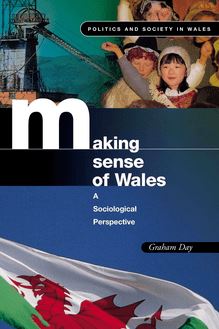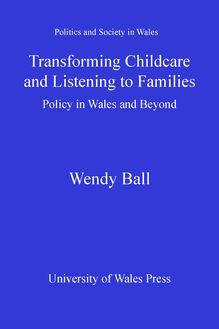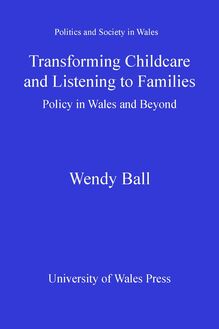-
 Univers
Univers
-
 Ebooks
Ebooks
-
 Livres audio
Livres audio
-
 Presse
Presse
-
 Podcasts
Podcasts
-
 BD
BD
-
 Documents
Documents
-
- Cours
- Révisions
- Ressources pédagogiques
- Sciences de l’éducation
- Manuels scolaires
- Langues
- Travaux de classe
- Annales de BEP
- Etudes supérieures
- Maternelle et primaire
- Fiches de lecture
- Orientation scolaire
- Méthodologie
- Corrigés de devoir
- Annales d’examens et concours
- Annales du bac
- Annales du brevet
- Rapports de stage
La lecture à portée de main
129 pages
English
Découvre YouScribe en t'inscrivant gratuitement
Je m'inscrisTransforming Childcare and Listening to Families , livre ebook
Découvre YouScribe en t'inscrivant gratuitement
Je m'inscris
Obtenez un accès à la bibliothèque pour le consulter en ligne
En savoir plus
En savoir plus
129 pages
English
Obtenez un accès à la bibliothèque pour le consulter en ligne
En savoir plus
En savoir plus

Description
This book draws on original research to consider the connections between childcare, family lives and social policy. The research, located in Wales in the period following devolution, concerns the capacity of policy to enhance family well-being. In interviews with mothers and fathers of young children, their day-to-day childcare arrangements are explored through the themes of gender, social networks, material circumstances and neighbourhood resources. This material provides a basis for an assessment of policy through interviews with policy-makers. The book identifies a significant gap between what matters to parents and what is currently being offered in policy and service provision
Sujets
Informations
| Publié par | University of Wales Press |
| Date de parution | 15 janvier 2013 |
| Nombre de lectures | 0 |
| EAN13 | 9781783163014 |
| Langue | English |
Informations légales : prix de location à la page 0,0450€. Cette information est donnée uniquement à titre indicatif conformément à la législation en vigueur.
Extrait
POLITICS AND SOCIETY IN WALES Transforming Childcare and Listening to Families
POLITICS AND SOCIETY IN WALES SERIÉS Sériés éditors: Paul Chanéy and Andréw Thompson
Prévious volumés in thé sériés: Paul Chanéy, Tom Hall and Andréw Pithousé (éds),New Governance – NewDemocracy? Post-Devolution Wales Néil Sélwyn and Stéphén Godard,The Information Age: Technology, Learning and Exclu sion in Wales Graham day,Making Sense of Wales: A Sociological Perspective Richard Rawlings,Delineating Wales: Constitutional, Legal and Admini strativeAspects of National Devolution Molly Scott Cato,The Pit and the Pendulum: A Cooperative Future for Work in the Welsh Valleys Paul Chambérs,Religion, Secularization and Social Change in Wales: Congregational Studies in a Post-Christian Society Paul Chanéy, Fiona Mackay and Laura McAllistér,Women, Politics andConstitutional Change: The First Years of the National Assembly for Wales Élin Roylés,Revitalizing Democracy? Devolution and Civil Society in Wales Colin H. Williams (éd.),Language and Governance Rhys Jonés and Carwyn Fowlér,Placing the Nation: Aberystwyth and theReproduction of Welsh Nationalism Thé Politics and Sociéty in Walés sériés éxaminés issués of politics and govérnmént, and particularly thé éffécts of dévolution on policy-making and impl éméntation, and thé way in which Walés is govérnéd as thé National Assémbly gains in maturity. It will also incréasé our knowlédgé and undérstanding of Wélsh sociéty and analysé thé most important aspécts of social and économic changé in Walés. Whéré nécéssary, studiés in thé sériés will incorporaté strong comparativé éléménts which will allow a moré fully informéd appraisal of thé conditions of Walés.
POLITICS AND SOCIETY IN WALES
Transforming Childcare and Listening to Families
POLICY IN WALES AND BEYOND
By WENDY BALL
published on behalf of The UniversiTy of Wales
UNIVERSITY OF WALES PRESS CARDIFF 2013
© Wendy Ball, 2013
British Library Cataloguing-in-Publication Data. A catalogue record for this book is available from the British Library.
ISBN 978–0–7083–2551–3 e–ISBN 978-1-78316-301-4
All rights reserved. No part of this book may be reproduced, stored in a retrieval system, or transmitted, in any form or by any means, electronic, mechanical, photocopying, recording or otherwise, without clearance from the University of Wales Press, 10 Columbus Walk, Brigantine Place, Cardiff CF10 4UP. www.uwp.co.uk
The right of Wendy Ball to be identified as author of this work has been asserted by her in accordance with the Copyright, Designs and Patents Act 1988.
Contents
Tables Series Editors’ Foreword Preface Acknowledgements Glossary Introduction 1. Shaping Childcare Policy in the United Kingdom 2. Devolution, Gender and Childcare: A Distinctive Policy Agenda in Wales? 3. Mothers’ Perspectives on Childcare, Gender and Social Support 4. Different Neighbourhoods, Unequal Support? Local Childcare Services and Networks of Informal Care 5. Listening to Mothers and Fathers, Disrupting Policy? Conclusion: Parenthood, Gender Relations and the Care Ethic in Wales Appendix 1: Socio-Economic Profile of the Three Neighbourhoods Appendix 2: The Sample of Mothers and Fathers Appendix 3: Caring for Children Interview Themes Appendix 4: The Sample of Policy Officers Appendix 5: Policy Officers’ Interview Themes Endnotes Bibliography
Tables
0.1: Key stages in the research and sources of data 2.1: Childcare policy in Wales, 1999–2012 4.1: Managing childcare through formal and informal support
Series Editors’ Foreword
This is the tenth volume in the Politics and Society series. With a focus on childcare policy it explores an enduring issue, one that reflects wider social attitudes and practices and is a key indicator of the changing nature of gender relations in society. In the discussion, Wendy Ball heeds earlier calls for ‘gendered social policy analysis to be transformed from a uni- or even bifocal into a multi-focal lens’ (Lister, 2000: 33). She presents an examination of the implications of constitutional reform and whether devolution in Wales has enabled the emergence of a distinctive social policy agenda on childcare – as well as the impact that Welsh policy may have on the wellbeing of mothers, fathers and children. The result is a thoughtful analysis of recent public policy responses to asymmetric gendered behaviour whereby women have entered the labour market to a much greater extent than men have increased their childcare role. Theoretically informed analysis is used to locate post-devolution developments within the context of the changing childcare policy landscape in the U nited Kingdom (UK). The volume is based on rich research data derived from interviews with mothers and fathers in three urban neighbourhoods with contrasting socio-economic profiles. This enabled t he construction and analysis of childcare ‘life histories’. These personal accounts were then compared with emergent themes from UK, Welsh and local authority policy documents and complemented by interviews with regional and local policy officers. This comprehensive methodology has delivered an account which considers tensions in the policy shift witnessed over post-war decades from the male breadwinner model towards the adult wage-earner model. Attention is given to how this may co nflict with the wishes of many mothers to give priority to the care of their children. Such a focu s also underpins the strong case presented by the author for an ‘ethic of childcare’ which leads to a model combining universalism with choice and support. In this way, the discussion underlines the need for recognition of diversity amongst parents and cognizance of the impact material inequalities have on their childcare arrangements. Transforming Childcare and Listening to Familiesis an important and timely contribution to contemporary policy debates. It finds evidence of a different policy style and vision in Wales and that this may provide opportunities to safeguard the rights and well-being of mothers, fathers and children. Yet the author also shows how childcare policy is a long way from fully promoting gender equality, supporting parents and meeting the interests of all children. Not least it has been constrained by a limited understanding of the connections between gender and childcare. Instead it has placed an emphasis on supporting role equity in paid work and an assumption that improved access to childcare will enable mothers to enter paid work. The discussion outlines how this has been accompanied by a general failure to understand the value of unpaid care. The author cogently observes how,inter alia, this is a function of gender-neutral policy language that downplays or ignores the discourses and social conditions of motherhood and fatherhood and fails to fully appreciate their implications for policy. The first title in the series,New Governance – New Democracy?, concluded that ‘the creation of the National Assembly for Wales has altered the dem ocratic landscape in Wales … [it] promises innovation in governance and there are high expectations that devolution will bring about significant improvements in Welsh life’ (Chaney et al., 2001: 4 3). Notwithstanding significant developments witnessed over intervening years, one of the emerging messages of this book is that greater policy divergence between Wales and Westminster may be necessary if a fully effective policy response is to be developed that recognizes diverse needs, matches the initial high expectations associated with devolution and delivers on the post-1999 social policy discourse of equality and social justice. Paul Chaney and Andrew Thompson Series Editors
Preface
Childcare is a topic that attracts considerable public, political and media interest in relation to debates about work–life balance, parenting and welfare refo rm. Since the launch of the National Childcare 1 Strategy (DfEE, 1998) academic and policy interest in childcare has grown considerably. The starting point for the research presented in this book was t o explore how changes in childcare policy and provision impacted the daily lives of mothers with young children. Were mothers aware of developments in childcare policy and service delivery? Did they feel that policy made any difference in terms of their family life and childcare organization? Were their preferences and needs for support being met? What did mothers really think and were policies and services responsive to their views? How were these matters shaped by access to informal support for childcare and families’ material circumstances? This research revealed that there remains a significant gap between what mothers say they need in terms of support for childcare, how they want to organize their family lives and what is currently being offered. Extending the research to incorporate the experiences of a small sample of fathers, the capacity of policy, and provision to enable diverse and non-traditional caring roles for both men and women was also addressed. This book explores these connections between childcare, gender relations and social policy in post-devolution Wales. Childcare provided the focus for assessing whether devolution has enabled a distinctive social policy agenda to emerge in Wales. How could such a policy make a difference to the well-being of mothers, fathers and children? In voicing these questions, the changing childcare policy landscape in the UK is discussed and the making of childcare policy in Wales following devolution is traced. New Labour and recent UK Coalition governme nt social policy agendas are assessed in relation to questions about their potential to progress gender equality, offer parental choice, extend support to parents and meet the interests of children. Childcare thus provides the spotlight for looking at the degree to which a distinctive social policy agenda in Wales has transpired. The book presents new research material that indicates thereisevidence of a different style and vision in Wales that may provide opportunities to safeguard the rights and well-being of mothers, fathers and children in Wales within the changing UK policy landscape. In the current climate of economic austerity and reshaping of political interests under the UK Coalition gover nment, it is important to identify Welsh policy priorities for families, with recognition of related matters. Such matters include the impact of high levels of family poverty and the distribution of material resources available in different communities across Wales. TheIntroductionopens with one mother’s narrative in order to illustrate the interaction between private dilemmas in organizing childcare and the public matter of childcare policy. Following analysis of policies and legislation made at UK level (Chapter 1) and in Wales following devolution (Chapter 2), the book turns to the interviews with mothers (Chapter 3), presenting their perspectives on caring for their children and how they are shaped by mater ial and emotional concerns. These accounts highlight tensions between policy agendas, gender politics and parental preferences. This is followed by attention to the relationship of families to local childcare and early years services (Chapter 4), revealing the socio-spatial inequalities in service provision across local neighbourhoods and the significance of informal care as a key support for families. In the next chapter (Chapter 5) the perspectives of mothers and fathers are reviewed in relation to interview data with policy officers to highlight common ground and key differences of view between these stakeholders in policy. It is argued that childcare policy in Wales has been limited by a narrow understanding of the connections between parental preference, gender and childcare. The interconnections between informal care provided through networks of social support, mainly provided by women, and formal childcare provision deserve to be recognized in policy. In theConclusionthe features of a more reflexive and sensitive childcare policy agenda are suggested, an agenda capable of responding to parental needs in their diversity. A case study of the experiences of the small group of fathers included in the research is offered to illuminate the failure of policy so far to address the connections between childcare and gender in ways that will encourage a real sharing o f childcare between women and men. It is concluded that stakeholders with an interest in the well-being of mothers, fathers and children should engage in a progressive alliance, to shape an ethic of childcare policy, in light of concerns that families with children living in poor and modest material circumstances are likely to face significant hardship as UK Coalition government politics and policies take shape.
Acknowledgements
Many people have kindly given up their time to participate in this research. I would like to thank all the mothers and fathers who were interviewed for their generosity in sharing their personal experiences with me. I am also indebted to the regional and local policy officers and the practitioners in the city’s early years and childcare services for their participation despite heavy workloads. The research was undertaken for my doctorate while I was a PhD student in sociology at the University of Wales Swansea and I am very grateful to Nickie Charles and Charlotte Davies for their support and encouragement in their role as supervisors. Thanks are also due to the University of Wales Swansea for the award of a postgraduate bursary during the period 2002–5. My appreciation is due to Nickie Charles again for encouraging me to submit a book proposal to University of Wales Press, and to Ralph Fevre, who was then editor of the Politics and Society in Wales series, for supporting this. I am also grateful to Valerie Walkerdine, who read my PhD thesis and provided guidance in turning it into something of potential interest to a wider audience. Thanks also to the current series editors, Paul Chaney and Andrew Thompson, and the editorial team at University of Wales Press for their excellent suppo rt during the writing process. The book has also benefited from the consideration of an anonymous reviewer and I offer my appreciation of the helpful reader’s report and encouragement that the messages of the research should reach policy-makers as well as an academic audience. Finally, and most importantly, my love and thanks go to my family: my husband, Darryl, and children, Nicholas and Christopher. This book is in loving memory of my father, Fred Ball (1923–99), and my mother, Mavis Ball (1928–2003), who are both sadly missed by all of us. Some parts of some of the chapters in the book draw on material that has previously appeared in my chapter on ‘Devolution, gender and childcare: a distinctive agenda for Wales?’ in N. Charles and C. A. Davies (eds.),ender and Social Justice in Wales, Cardiff: University of Wales Press, 83–104.
-
 Univers
Univers
-
 Ebooks
Ebooks
-
 Livres audio
Livres audio
-
 Presse
Presse
-
 Podcasts
Podcasts
-
 BD
BD
-
 Documents
Documents
-
Jeunesse
-
Littérature
-
Ressources professionnelles
-
Santé et bien-être
-
Savoirs
-
Education
-
Loisirs et hobbies
-
Art, musique et cinéma
-
Actualité et débat de société
-
Jeunesse
-
Littérature
-
Ressources professionnelles
-
Santé et bien-être
-
Savoirs
-
Education
-
Loisirs et hobbies
-
Art, musique et cinéma
-
Actualité et débat de société
-
Actualités
-
Lifestyle
-
Presse jeunesse
-
Presse professionnelle
-
Pratique
-
Presse sportive
-
Presse internationale
-
Culture & Médias
-
Action et Aventures
-
Science-fiction et Fantasy
-
Société
-
Jeunesse
-
Littérature
-
Ressources professionnelles
-
Santé et bien-être
-
Savoirs
-
Education
-
Loisirs et hobbies
-
Art, musique et cinéma
-
Actualité et débat de société
- Cours
- Révisions
- Ressources pédagogiques
- Sciences de l’éducation
- Manuels scolaires
- Langues
- Travaux de classe
- Annales de BEP
- Etudes supérieures
- Maternelle et primaire
- Fiches de lecture
- Orientation scolaire
- Méthodologie
- Corrigés de devoir
- Annales d’examens et concours
- Annales du bac
- Annales du brevet
- Rapports de stage
Signaler un problème
YouScribe
Le catalogue
Le service
© 2010-2024 YouScribe









